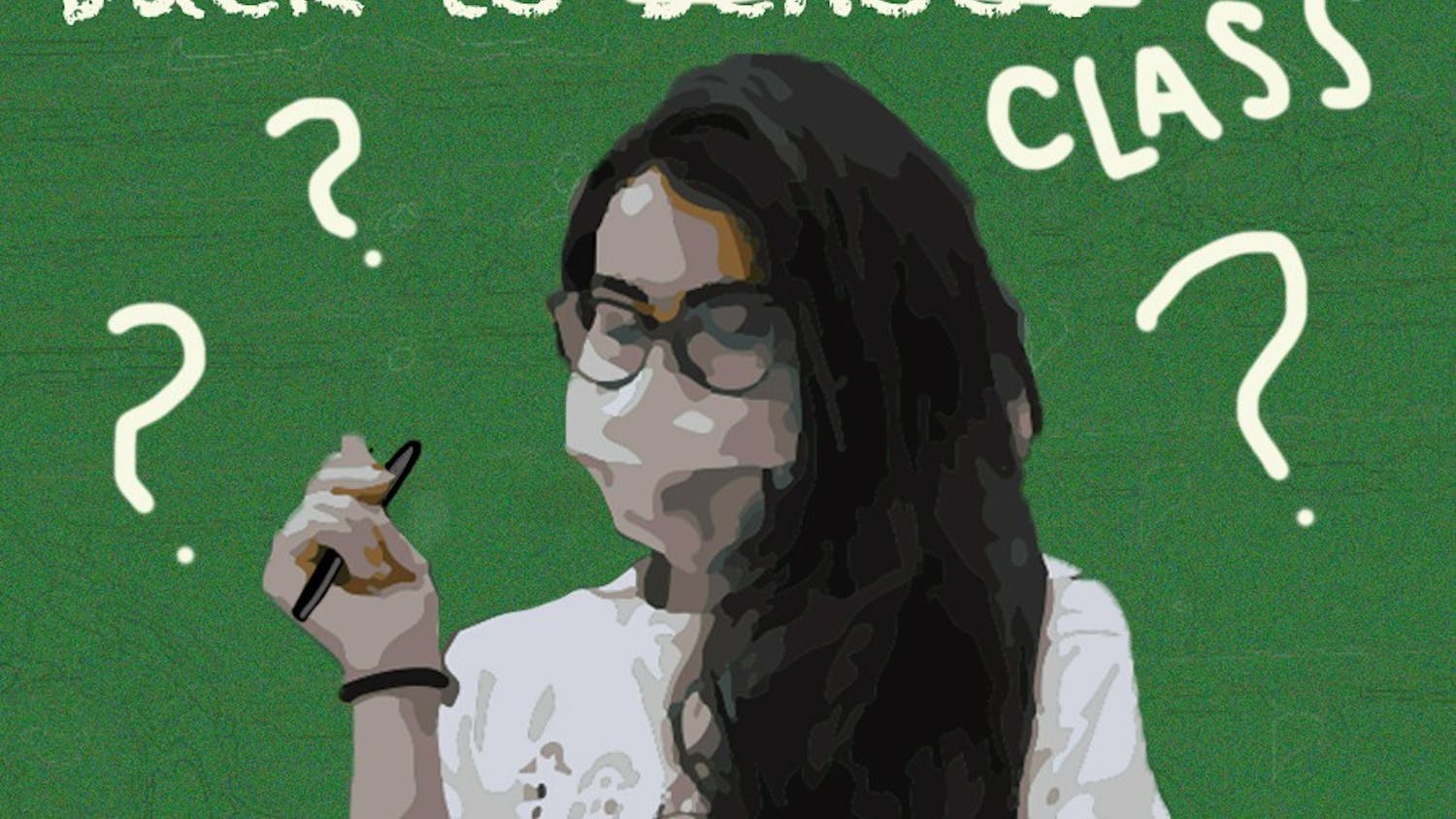This article is featured in the 2021 Winter Carnival special issue.
In order to have most lectures recorded, students used to need to secure accommodations from the College for a documented disability. Then COVID-19 hit — now, in the age of Zoom classes and asynchronous learning, recorded lectures are relatively routine.
For students with accommodations and the administrators who work with them, the pandemic has underscored the effectiveness of some accommodations — such as increased flexibility with assignment deadlines, extra time on exams and recorded lectures — and the potential for a more accommodating class environment in the future.
“It was this huge, you know, foot in the back that pushed us into this new mindset of how do we teach and learn, how do we do work?” said institutional compliance officer for the Americans with Disabilities Act Cathleen Trueba. “And I'm pretty optimistic that we'll find some things that we used to think we needed to do for this little group of people. Now it's like, actually, a lot of people could benefit from that.”
Academic accommodations are organized largely through the Student Accessibility Services office, though changes to housing and dining are usually handled separately, assistant dean and SAS director Alison May noted. Broadly speaking, she said they are “adjustments” intended to “level the playing field” — to ensure equal access to education for students with disabilities of some kind.
“The idea is that there is some barrier to access being presented by the assignment or the curriculum itself, and our role is to reduce or remove that barrier,” May said.
Under the ADA and its predecessor, Section 504 of the Rehabilitation Act of 1973, Dartmouth is required to “make its programs and services accessible via reasonable accommodation to anybody that's otherwise qualified,” according to Trueba. Each student is entitled to a lack of discrimination based on disability status and to a determination process for what “reasonable accommodation” looks like for them, she added.
At Dartmouth, that “interactive process” is individualized, May said. Students meet with SAS, discuss their needs, provide documentation of their disabilities and create a plan with the SAS officer for accommodations that can then be sent to professors.
“[They] really work with you to get you everything that you need,” Anthe Roberts ’22, who has attention deficit hyperactivity disorder as well as mild cerebral palsy, said.
“ ... I’d never thought about recording lectures, and then I realized that I needed it, and it was so helpful, but it’s something that I never would have thought to ask for,” Roberts added.
Such accommodations are only available for students with proper documentation — multiple students with accommodations noted that without it, the process can be difficult. Alessa Lewis ’22 said that her accommodations were “predicated” on her ability to provide up-to-date documentation of ADD and slow processing. Roberts also felt fortunate to have a “paper trail” dating back to an ADHD diagnosis at age nine.
May clarified that documentation is sometimes not needed, especially when a condition is “readily apparent,” but that usually, some form of verification is required to assess the “level of functional impact” for the student.
May said that the office requires documentation to demonstrate that accommodations are not “unfair advantages,” but are actually mechanisms to equalize the learning environment. In the case of dyslexia, for example, documentation showing a student’s reading skills are well below average “means that extra time might be something appropriate for that student, to be able to have the same or equal access as a student without a disability.”
All in all, about 450 students — roughly 10% of undergraduates — are registered with SAS, according to May.
The registration process can take as little as a week to complete with the proper documents, and has not changed substantially since the beginning of the pandemic. What has changed is the general campus outlook on accommodations like class recording, according to May and Trueba.
“A lot of professors are now recording their lectures — which is awesome, and is something that I think all professors should do, all the time, because there’s no reason not to,” Roberts said.
May said that the remote format of classes has allowed students with disabilities who never completed their degrees to return to Dartmouth to do so, noting that she knows of a ’12 and a ’17 in that situation. More broadly, the shift has made classes more accessible for some current students.
For example, May said that winter poses difficult conditions for students with mobility impairments. The switch to remote classes, she said, would allow such students to avoid unnecessary winter off terms.
Dartmouth has also gained access to a beta version of an artificial intelligence-based live closed captioning system for Zoom, May and Trueba said. The tool, which can be enabled by the host of a Zoom call, automatically generates fairly accurate closed captions for the call, making them more accessible for anyone with hearing loss or attention deficit disorders — as well as students for whom English is a second language, or who need to step away from the screen for a moment, Trueba added.
May said that she believes the pandemic has actually led to fewer students requesting accommodations, because many common accommodations are already built into the structure of the remote classes — an aspect of online learning that May said she hopes will continue after COVID-19 recedes.
Bill Cheng ’22, co-president of Access Dartmouth, a club that advocates for students with disabilities, said that the group’s current focus is consulting with academic departments on accessibility issues and preparing a handbook for new students concerned about accessibility, as well as providing a social space for students to share “access challenges.”
Last summer, the group achieved a victory — SAS began allowing students to automatically send accommodation letters via email to professors rather than meet directly with them to arrange accommodations for a class. May said several panels that the club held highlighted the stress that the in-person delivery often put on students helped to spur the change, and Cheng said that “the dynamic has changed a little bit” between students and professors thanks to the switch.
Roughly 700 accommodation emails were sent through the SAS online portal this term, May said. Students generally take two to three classes, but not all of the approximately 450 registered students are taking classes this term, and not all send emails to every professor, she clarified.
Challenges remain, however, as the College begins looking toward a broader return to campus. Cheng pointed out that many buildings, like Dartmouth Hall (which is undergoing renovations), remain inaccessible to students with physical disabilities.
Cheng suggested that increased faculty training could help College educators be “more understanding” of students with disabilities. While Cheng has a disability — cerebral palsy — that is more “visible,” he noted that for students with less outwardly apparent disabilities, “it becomes more difficult for them to advertise that, and also for professors to perceive a need for those accommodations.”
Roberts said that while some professors are enthusiastic about working to provide accommodations, others “will treat it like a chore that they have to give you the accommodations that you legally have the right to.” According to Roberts, one professor had objected to rescheduling a time-and-a half exam after an emergency room visit, citing the specific inconvenience of moving around the larger block of time.
Lewis said that she experiences less of a general stigma around accommodations in college than she did in high school.
“I think in college, it's like everyone has their own situation,” Lewis said. “And this is what needs to happen for them to be on an equal playing field.”
Cheng noted that students “don’t have to have a disability to have challenges” and encouraged anyone who may have circumstances that leave them struggling to reach out to SAS or their dean. The goal of Access Dartmouth, he said, is “universal design” — a setup where accommodations are not necessary because barriers to access have been lowered for everyone.
“It would be a very good thing,” Cheng said, “if everyone’s needs could be met, so that no one would have to feel that they weren’t able to function at their maximum potential.”





